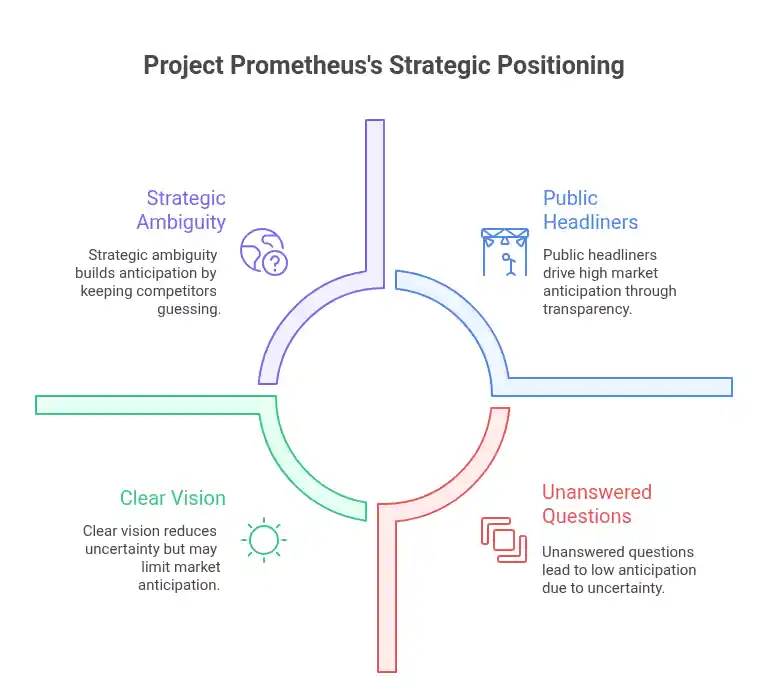Table of Contents
Four years after stepping down as CEO of Amazon, Jeff Bezos is returning to a chief executive role. He is stepping onto one of the most competitive and consequential stages in the world: artificial intelligence. His new venture is a formidable startup named Project Prometheus.
Bezos has appointed himself co-CEO of the new company. This marks his first formal operational role since leaving Amazon. His re-entry signals a major new development in the high-stakes AI sector.
The venture is launching with an astonishing $6.2 billion in initial funding. This level of initial capital immediately establishes Project Prometheus as a significant new player, signaling a serious intent to compete in the crowded AI landscape.
Deconstructing Project Prometheus
The foundation of any ambitious startup rests on three critical pillars: its leadership, its financial backing, and its human capital. An analysis of these core components reveals the immense scale and strategic intent behind Project Prometheus from its very inception.
The Dual-CEO Leadership
This new role marks the first formal CEO position Jeff Bezos has taken since leaving Amazon, though he remains closely involved with his aerospace company, Blue Origin. His return to the helm of a new company, particularly in the fast-moving AI space, brings decades of experience in building globally dominant enterprises.
Leading the company alongside Bezos is his co-founder and co-CEO, Vik Bajaj, a celebrated tech executive in his own right. Bajaj, a physicist and chemist, is best known for his work at Google’s moonshot factory, X, where he founded the health startup Verily. His deep technical and scientific background provides a powerful complement to Bezos’s strategic and commercial expertise.
A Staggering War Chest
Project Prometheus has already secured an incredible $6.2 billion in funding. This is more capital than many successful companies manage to raise over their entire lifetimes. This level of financial backing from day one is a clear statement of intent, signaling that the venture has the resources to pursue long-term, capital-intensive research and development without the typical constraints faced by startups. It reflects immense confidence from its backers in the vision and leadership of Bezos and Bajaj.
Assembling an Elite Team
The company has moved aggressively to build its workforce, already hiring 100 employees. Critically, it has poached top talent directly from the industry’s most dominant players, underscoring its ambition to compete at the highest level. Key talent has been sourced from:
- OpenAI
- DeepMind
- Meta
This targeted recruitment strategy is a classic move to acquire not just skilled individuals but also invaluable institutional knowledge from direct competitors. It sends a clear message that Project Prometheus intends to challenge the established leaders of the AI revolution. With its foundational elements in place, the company now turns to face the challenging market it is built to disrupt.
Navigating a Crowded and Costly Marketplace
Project Prometheus enters an artificial intelligence industry defined by fierce competition and staggering costs. It is an environment where billions of dollars are being poured into rivals and fundamental questions about long-term financial viability are beginning to surface.
Bezos and Bajaj join a crowded AI marketplace where competitors like OpenAI are already backed by billions in investment. This intense competition is precisely what fuels growing market skepticism, as experts question the financial sustainability of a capital-intensive arms race where even the most prominent companies are still grappling with a clear path to profitability.
This market skepticism is exemplified by Michael Burry, the investor known for predicting the 2008 housing crisis. Burry recently invested $1 billion in bets that shares of AI-related firms Palantir and Nvidia will fall. He has also accused some big tech firms of using “accounting tricks to artificially boost earnings,” adding a potent voice to the chorus of caution. This backdrop of market pressure and financial scrutiny raises the stakes for Prometheus, making the lingering questions about its specific strategy and technology all the more critical.
Unanswered Questions and Future Implications

While the headliners and the funding figures are public, a deliberate veil of secrecy surrounds the core mission of Project Prometheus. This calculated ambiguity is a strategic asset, building market anticipation while keeping competitors in the dark. For now, the venture remains an enigma, defined as much by what we don’t know as by what we do.
Several critical questions about the company’s operations and strategy remain unanswered:
- Company Focus: While the startup will focus on “AI for engineering and manufacturing,” the specifics of “how its technology might function” have not been disclosed.
- Company Base: Bezos did not disclose where the company will be based.
- Company History: It is currently unclear how long the company has existed.
This lack of information creates both intense intrigue and significant uncertainty within the tech community. Competitors are left to speculate on the precise threat Project Prometheus poses, while potential partners and customers await a clearer vision. The “Prometheus Enigma” ensures that all eyes will be on its next move.
A New Chapter for Bezos and a New Contender in AI
Jeff Bezos’s return to a CEO role with Project Prometheus marks a pivotal new development in the artificial intelligence industry. Backed by an unprecedented $6.2 billion in funding and a hand-picked team of elite talent poached from AI’s top firms, the company has instantly established itself as a major new contender.
Yet, the venture launches into a turbulent market characterized by intense competition and growing skepticism about the industry’s financial sustainability. For all its immense potential, Project Prometheus faces significant challenges and a host of unanswered questions about its ultimate mission and technology.
The tech world will be watching closely. The launch of Project Prometheus is more than just the start of a new company; it is a test of whether a legendary founder, armed with nearly unlimited capital, can forge a new leader in the defining technological revolution of our time.